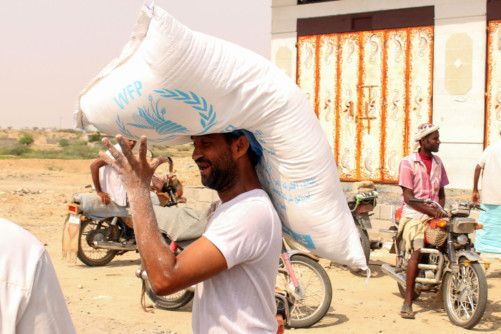
Sanaa: Yemen’s rebels, previously accused of diverting humanitarian aid in the war-torn country, claimed Friday that the World Food Programme lacked neutrality, after it won the Nobel Peace Prize for fighting global hunger.
Meanwhile, Yemen’s internationally-recognised government welcomed the choice of winner, pointing to the “wise and courageous” leadership of the UN agency’s executive director, David Beasley.
Iran-backed Al Houthi militia has been fighting for control of Yemen since 2014.
A Saudi-led military coalition intervened in support of the government the following year.
“We find that the WFP has largely failed in the biggest task for which it was chosen (for the Nobel Peace Prize), and that is combatting hunger,” Talaat Al Sharjabi, an Al Houthi spokesman, told AFP shortly after the announcement.
“A large number of people suffer from malnutrition... and there is also a failure on the WFP’s part to be neutral in terms of humanitarian aid distribution,” he said.
Yemen’s government, meanwhile, praised the organisation.
“The WFP plays a pivotal role in relief efforts in Yemen... and has been able to impose its conditions on the Houthis and implement different programmes,” the chairman of Yemen’s relief committee, Abdul Raqib Fateh, told AFP.
The WFP has had a troubled relationship with the militia, who control much of the north of the country, including the capital Sanaa.
At the end of 2018, the UN organisation accused the rebels of “criminal behaviour” and of selling food aid, to which the Houthis responded by claiming that the WFP was sending “rotten food”.
The organisation halted deliveries in Houthi-controlled areas for two months last year as it pushed for a biometric registration scheme to avoid the diversion of supplies.
In early August 2019, it reached a deal to resume deliveries after the Houthis offered guarantees concerning the beneficiaries.
That same month, rebels destroyed tonnes of food aid they said had expired after it was reportedly held up for months.
A UN source said at the time that the aid had been intended for delivery to families in Yemen’s third city of Taez but “ended up detained at a checkpoint for months and months”.
Aiming to feed 13 million people each month, the WFP’s operation in Yemen is its largest emergency response in the world.
The country, with a population of around 29 million, is living through what the UN has described as the “largest humanitarian crisis in the world”.
Aid has recently been cut at hundreds of health centres and some humanitarian programmes reduced or shut down, as the UN struggles for financial support.
The WFP has said it urgently needs over $500 million “to ensure uninterrupted food assistance until March 2021”.








